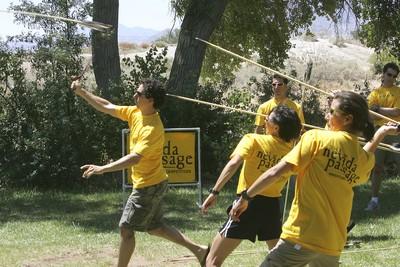A wagerless trip to Nevada

Just grab the handle and pull. That’s what Dave Nicholas told a group of 20 tourists on the outskirts of Las Vegas Monday morning.
Nicholas wasn’t explaining how to operate a slot machine. He was demonstrating the technique to use an ancient hunting weapon called an atlatl, essentially a stick with a handle used to fling a spear.
And the demonstration at Floyd Lamb State Park was about as close as these tourists would get to the Strip during their five-day stay in Nevada.
This group was heading away from Las Vegas, camera crew in tow, to ride bikes, drive dune buggies and sling spears in some of Nevada’s most far-flung outposts.
Their Silver State exploits between now and Saturday will be filmed, edited, distributed and played for as many as 2 million people in more than 80 television markets as part of “The Nevada Passage,” a reality television competition aimed at expanding people’s perception of the state.
“A lot of people think it is just Las Vegas and a desert,” said competitor Ildiko Lengyel, 29, a commercial airline pilot from Park City, Utah.
The athletic competition begins today with a run and rock scramble at Valley of the Fire State Park and culminates with a back country skiing race at Mount Rose Ski Resort near Reno.
In between they’ll race dune buggies on the Amargosa Dunes near Beatty, race bicycles on Alkalai Dry Lake near Tonopah and explore the ghost town Rhyolite near Death Valley.
The participants picked for the event represent a wide range of ages and professions and the chosen activities are challenging, but realistic, options for most reasonably fit people.
“This is stuff that people can do,” said Janet Clark, president of TEAM Unlimited. She joined Nicholas, senior vice president of the company, for the event on Monday. “Anybody can run the Valley of Fire. Anybody can ride their bike around Alkalai Lake.”
It’s the third edition of the made-for-television competition sponsored by the Nevada Commission on Tourism. The show is a way to attract tourists to parts of the state that are drowned out of the national spotlight by the bright neon glow of Las Vegas and, to a lesser extent, Reno.
The first two editions of “The Nevada Passage” reached an estimated 5.4 million viewers across the country, according to the tourism commission and TEAM Unlimited of Honolulu, the company that produces the show.
The idea is to stretch the $13.6 million the state of Nevada budgets annually to promote tourism with a television show aimed at a lucrative niche of adventure tourists who are unaware of hiking, climbing, biking and other nongambling opportunities in the Silver State. The Las Vegas Convention and Visitors Authority, in contrast to the state office, projects it will generate $285 million in revenue in the upcoming year, much of which is spent promoting Las Vegas.
“The world sees the Las Vegas Strip,” said Chris Chrystal, spokeswoman for the tourism commission. “People don’t see Ely and Austin and Pahrump.”
With Las Vegas accounting for nearly every reference to Nevada on national television and adventure tourism competitors like Hawaii, Arizona, California and Utah among states with bigger marketing budgets, rural parts of the Silver State need all the help they can get.
“I haven’t advertised. I don’t know how,” said Gail Morehead, owner of the International Cafe in Austin, a town in Central Nevada with about 200 residents.
Morehead, who bought the cafe about six months ago, said most of the town’s residents moved away in a mining slump and that a mountain bike store that capitalized on nearby trails recently closed shop.
The town was a stop on “The Nevada Passage” in 2006. Other stops for “The Nevada Passage” in past years include Winnemucca, Lamoille, Fallon and Virginia City, which recently added a 200-room hotel to its small room inventory, Chrystal said.
But serving tourists beyond Las Vegas remains a challenge.
Colorado and Utah are better-known skiing and biking destinations than Nevada. California is a global tourism mecca. And hospitality businesses in tiny Nevada outposts don’t have access to well-trained workers or the means to pay the type of wages front-line workers earn in Las Vegas.
“The Nevada Passage” won’t solve any of those problems. But raising the profile of rural Nevada among free-spending adventure tourists considering new destinations is an important step in using tourism to boost small economies.
“What Nevada wants to do is get on the list,” Clark said. “The first job is to get on the list of consideration, then get up the list.”